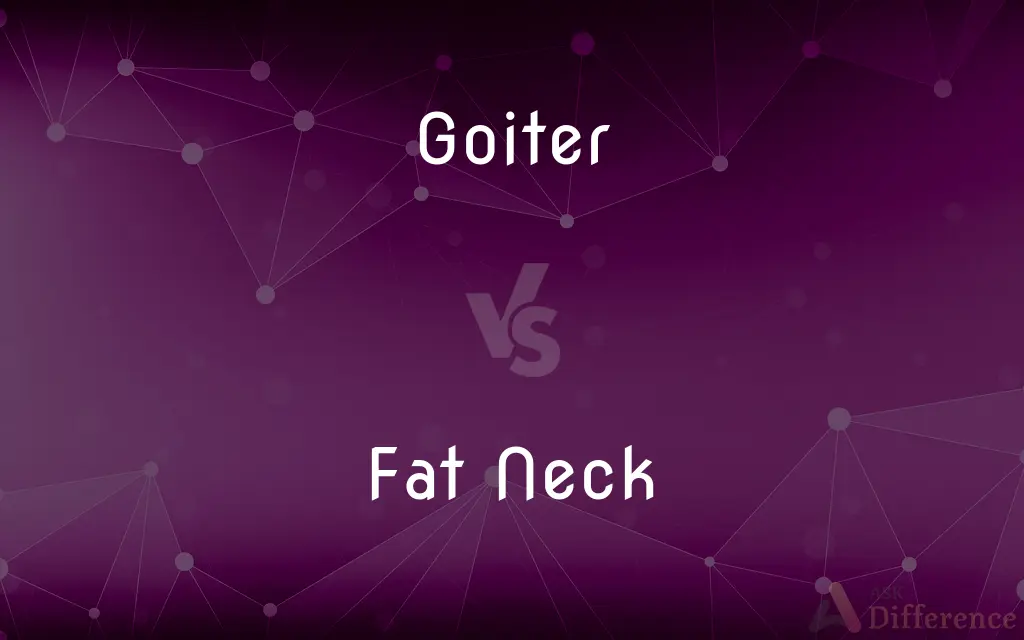Goiter vs. Fat Neck — What's the Difference?
By Maham Liaqat & Urooj Arif — Published on March 4, 2024
Goiter is the enlargement of the thyroid gland causing neck swelling, often due to iodine deficiency or thyroid disorders, while a fat neck results from the accumulation of fat in the neck area, typically linked to obesity or genetics.

Difference Between Goiter and Fat Neck
Table of Contents
ADVERTISEMENT
Key Differences
Goiter and fat neck both present as an enlargement in the neck area, but their causes diverge significantly. Goiter is primarily associated with thyroid gland issues, which can stem from iodine deficiency, autoimmune diseases, or thyroid nodules. In contrast, a fat neck is usually a consequence of excessive fat deposition, often related to overall body obesity, lifestyle factors, or genetic predisposition.
Both conditions can affect aesthetics and self-perception, while goiter may also signify underlying health concerns directly related to thyroid function. This can include symptoms like difficulty swallowing or breathing, whereas a fat neck might not have such direct health implications but is often associated with broader health risks, such as cardiovascular diseases due to obesity.
Treatment approaches for goiter and fat neck differ fundamentally. Goiter treatment may involve thyroid hormone replacement, iodine supplementation, or surgery in severe cases. For a fat neck, weight loss through diet and exercise is typically recommended, and in some cases, cosmetic surgery might be considered.
Diagnosing these conditions requires different medical evaluations. Goiter diagnosis often includes thyroid function tests and ultrasound, focusing on thyroid health. In contrast, a fat neck's assessment might be part of an overall evaluation of body fat and health, with no specific tests required beyond standard health assessments.
The impact on an individual's quality of life and health can vary. A goiter, depending on its size and cause, can lead to significant discomfort and potential complications if left untreated. A fat neck, while potentially a cosmetic concern, can also indicate a need for lifestyle changes to reduce obesity-related health risks.
ADVERTISEMENT
Comparison Chart
Definition
Enlargement of the thyroid gland.
Accumulation of fat in the neck area.
Causes
Iodine deficiency, thyroid disorders.
Obesity, genetics, lifestyle factors.
Symptoms
Swelling in the neck, difficulty swallowing.
Visible neck fat, possibly affecting appearance.
Treatment
Thyroid hormone replacement, surgery.
Weight loss, cosmetic surgery.
Health Implications
Can indicate thyroid issues, risk of complications.
Associated with obesity-related health risks.
Compare with Definitions
Goiter
A condition characterized by the enlargement of the thyroid gland.
Her doctor diagnosed her swelling in the neck as a goiter.
Fat Neck
Rarely presents direct health symptoms.
Her fat neck did not cause any discomfort, but she was conscious about its appearance.
Goiter
Can cause difficulty in swallowing or breathing.
The large goiter made it hard for her to swallow.
Fat Neck
Treatment primarily involves weight management.
He managed to reduce his fat neck by losing weight.
Goiter
Often results from iodine deficiency or autoimmune diseases.
He developed a goiter due to severe iodine deficiency.
Fat Neck
Often associated with lifestyle factors and genetics.
Despite being slim, his fat neck was due to genetics.
Goiter
May require medical intervention like surgery.
Surgery was recommended to remove his goiter.
Fat Neck
Can be a cosmetic concern for many.
Cosmetic surgery was an option she considered for her fat neck.
Goiter
Indicates potential thyroid function issues.
The presence of a goiter often points to underlying thyroid problems.
Fat Neck
An accumulation of excess fat around the neck area.
A fat neck can be a sign of overall obesity.
Goiter
A noncancerous enlargement of the thyroid gland, visible as a swelling at the front of the neck, that is often associated with iodine deficiency. Also called struma.
Goiter
Alternative spelling of goitre
Goiter
An enlargement of the thyroid gland, on the anterior part of the neck, usually resulting from iodine deficiency; bronchocele. It is frequently associated with cretinism, and was at one time common in mountainous regions, especially in certain parts of Switzerland. The incidence of goiter has been substantially reduced by addition of iodine to ceratin foods, such as salt.
Goiter
Abnormally enlarged thyroid gland; can result from under-production or over-production of hormone or from a deficiency of iodine in the diet
Common Curiosities
What is a goiter?
A goiter is the enlargement of the thyroid gland, often due to iodine deficiency or thyroid issues.
What causes a fat neck?
A fat neck is caused by the accumulation of fat, often related to obesity, lifestyle, or genetics.
Are goiter and fat neck treatable?
Yes, both conditions are treatable, with goiter treatments focusing on thyroid health and fat neck treatments on weight management or cosmetic surgery.
Is a fat neck always due to obesity?
Not always; genetics and specific lifestyle factors can also contribute to a fat neck, even in non-obese individuals.
Can a goiter lead to serious health issues?
Yes, untreated goiter can lead to complications such as difficulty breathing or swallowing.
Can diet affect goiter and fat neck?
Diet plays a role in both conditions; iodine-rich foods can prevent some goiters, while a healthy diet can reduce fat neck.
Can a fat neck be a sign of a more serious condition?
While a fat neck is often a cosmetic concern, it can be indicative of underlying health risks associated with obesity.
Can exercise reduce a fat neck?
Yes, exercise, as part of overall weight loss, can reduce the appearance of a fat neck.
Do goiters always show symptoms?
No, some goiters are asymptomatic, especially in the early stages.
What lifestyle changes can help with a fat neck?
Regular exercise and a balanced diet can help reduce body fat, including in the neck area.
How is goiter diagnosed?
Goiter is diagnosed through thyroid function tests, ultrasound, or physical examination.
Is surgery a common treatment for goiter?
Surgery is recommended for large goiters or when cancer is suspected.
How can I prevent goiter?
Adequate iodine intake and monitoring thyroid health can help prevent many types of goiter.
Can goiter affect both genders?
Yes, goiter can affect both males and females, though it's more common in women.
Are there any non-surgical treatments for goiter?
Yes, depending on the cause, treatments can include thyroid hormone replacement or iodine supplementation.
Share Your Discovery

Previous Comparison
Golden Flax Seeds vs. Brown Flax Seeds
Next Comparison
NFL vs. AFLAuthor Spotlight
Written by
Maham LiaqatCo-written by
Urooj ArifUrooj is a skilled content writer at Ask Difference, known for her exceptional ability to simplify complex topics into engaging and informative content. With a passion for research and a flair for clear, concise writing, she consistently delivers articles that resonate with our diverse audience.














































